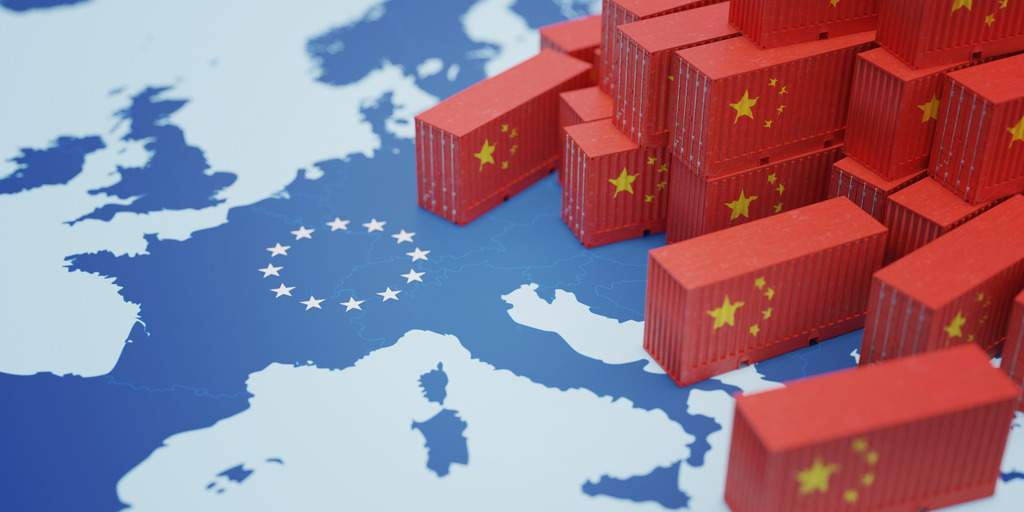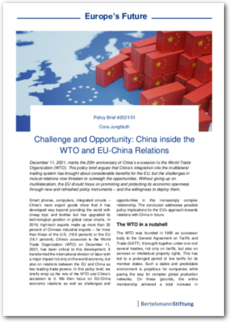Smartphones, computers, integrated circuits – China’s most important export goods show that the country is no longer just a “factory” supplying the world with cheap toys and textiles, but has worked its way up the global value chains in terms of technology.
China’s accession to the World Trade Organization (WTO) on December 11, 2001, has been critical to this development. It changed the international division of labor and increased global welfare. However, the integration of a large non-democratic non-market economy into the multilateral, rules-based world trading system has also brought about major challenges.
While China’s membership in the WTO has accelerated the country’s economic opening, it did – contrary to Western expectations – not lead not the transformation of the political system. Neither did the introduction of market-economy elements turn China into a western-style market economy. On the contrary, state intervention in the economy has increased significantly, especially since Xi Jinping took office.
The EU’s new strategic approach toward China needs time for implementation
Even 20 years after accession, important basic principles of the WTO, such as reciprocity and non-discrimination, are not fully met by China. The level playing field for Chinese and foreign companies hoped for by many western observers has failed to materialize.
Instead, the “competition of systems” that was pronounced dead after the collapse of the former Soviet Union is back on the agenda. The EU has therefore already adjusted its strategic approach toward China in 2019, adding the dimensions of “economic competitor” and “systemic rival” to the – still important – dimension of “cooperation partner.”
However, the practical implementation of this new approach to China is an ongoing process that is far from complete even after more than two years. The old mantra of “change through trade” needs to be replaced by a more careful balancing of economic benefits and geopolitical interests.
But this takes time. In the past, economic considerations and resulting benefits were at the core of the EU’s relations with China. Accordingly, mutual trade and bilateral investment between the two economic powers have increased significantly since China’s WTO accession in 2001: In 2020, China was the EU’s largest trading partner in goods, accounting for 16 percent of EU trade, 22.4 percent of EU imports, and 10.5 percent of EU exports. Hidden behind the mere trade figures is moreover the fact that China plays a central role in the global value chains of European companies.
While EU-China trade relations are clearly biased towards exports from China, the reverse is true of foreign direct investment from China to the EU: In 2019, the cumulated direct investment of Chinese companies in the EU amounted to 70 billion Euro, which is only about one-third of the 200 billion Euro that EU companies have invested in China.
This makes mutual investment relations asymmetrical in terms of volume. However, European high-tech companies that match industrial policies of the Chinese government have been a focus of Chinese acquisitions in the EU, especially since the announcement of the “Made in China 2025” strategy in 2015.
As a result, Chinese direct investment has come under greater scrutiny despite its comparatively small volume. This is also due to the lack in reciprocity: While the door to the EU’s internal market is still open for Chinese companies, European companies in China continue to face obstacles regarding market access and business operations.
Complaints about this have even increased recently. In addition, foreign companies in China are increasingly running the risk of becoming the pawns of geopolitical interests. And at the international level, China is positioning itself more and more clearly as an alternative and rival to the West in terms of its development model – and thus also its political system.
Challenge for the EU: Economic openness must not become a boomerang
The close economic ties with China, from which the EU and especially export-oriented member states such as Germany have benefited, could increasingly prove to be a risk in the future. A commercial interdependency is desirable from an economic perspective, since it fosters the international division of labor.
However, this interdependency may quickly become a critical dependency, if it is misused for political purposes. And China is inclined to exploit such asymmetric interdependencies directly or indirectly to achieve political goals. This makes the EU’s relations with China more challenging in the future.
On the one hand, it seems self-evident that the EU and China, as major economic players, should cooperate to ensure stability, prosperity, and sustainable development at the global level. In particular, problems such as combating climate change and the urgently needed reform of the WTO to ensure stable and predictable rules in the multilateral trading system cannot be solved without China.
On the other hand, the EU faces a China with which it is still not possible to compete on an equal footing. For its part, China also wants to reduce critical dependencies on foreign countries and strengthen its technological sovereignty. This will make the framework conditions for European companies in China even more difficult in the future. In this environment, the EU must ensure that its own economic openness does not become a boomerang.
5 suggestions for the EU’s future dealing with China
China is and remains an important partner for the EU. However, the dimensions of “competitor” and “rival” have gained in significance in this relationship since they were first mentioned in the EU’s 2019 strategy paper on China.
Recent developments, such as the increasing tensions with regard to the situation in Xinjiang, Hong Kong or Taiwan, have even brought systemic rivalry to the fore – at least from the EU’s perspective. In order to take even greater account of this new situation in the future, the EU should take a five-pronged approach in its dealings with China:
- It may be a truism, but the EU should act more consistently and in a more concerted manner toward China. Only if the EU brings its full economic weight to bear will it really be able to meet China on an equal footing and position itself as a geopolitically relevant player – as the current Commission is striving to do.
- Multilateralism remains the first and best option in international economic relations. Therefore, the EU should continue to work for a functioning WTO as a central pillar of the multilateral trading system. The involvement of China is crucial for this.
- As long as the future of multilateralism is unclear, bilateral agreements and strategic diversification of economic partners are the second best options. In this way, the EU can avoid or reduce unilateral dependencies that make it politically susceptible to blackmail.
- The EU should continue to review its external economic policy instruments and, if necessary, introduce new ones to respond to the increasing political weaponization of economic interdependencies. An important step could be the anti-coercion instrument, which the Commission presented on December 8. However, it is important to make sure that such measures remain transparent, moderate and compatible with WTO rules.
- The strongest instruments are of little use if they are only on paper. The EU must also be willing to actually deploy these instruments, if necessary – and make this very clear to China.






